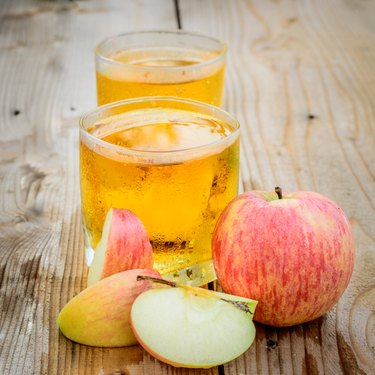
Making wise choices in the beverage department can definitely help you avoid weight gain and obesity. Drinks that seem perfectly healthy, such as apple juice and other fruity beverages, give you essential nutrients you need in your diet. But they also deliver a lot of extra calories if you drink them in excess. Drink fruit juice sparingly on your reduced-calorie diet.
Sugary Drinks
Video of the Day
Regular soft drinks -- colas, root beers, sweetened fruit punches and energy drinks -- have a bad rap among dieters because of the empty calories they contain. The Harvard School of Public Health reports that watery, sugary beverages can be hazardous to people trying to lose weight, as the body doesn't register the calories the beverages contain. According to Mayo Clinic, a 12-oz. can of regular soda can have 140 calories and 9 tsp. of added sugar. Fruit juice may be a healthier choice than soda pop simply because juice gives you vitamins and nutrients your body needs. However, when you compare them with a regular soft drink, apple juice and orange juice contain just as much sugar -- and an equal number of calories or more.
Video of the Day
Apple Juice
A single serving of brand-name apple juice has 100 calories and 15 g carbohydrates, all of which come from sugar. It also gives you 20 percent of your daily value, or DV, for vitamin C based on a 2,000-calorie diet, as well as 2 percent of your DV for calcium and iron. However, here's the caveat: A serving size is 6.75 oz., which is less than a cup. If you were to drink 12 oz. of apple juice -- the size of a can of regular cola -- you'd get around 178 calories from the beverage.
Healthier Beverages
Harvard recommends getting most of your fluid intake from plain water -- at least half, but up to 100 percent is fine. Leave one-third of your daily beverage intake for unsweetened tea or coffee and up to 20 percent for low-fat or nonfat milk. If you favor fruit juice, drink it very sparingly. One 4-oz. serving is all you need during the course of your day. Harvard advises giving regular and diet soft drinks a miss completely. Water doesn't need to be bland and tasteless; if you crave a refreshing, fruity low-calorie drink, add a splash of fruit juice to plain or sparkling water and serve it on ice. Enhance the flavor even more with a twist of citrus or a sprig of crushed mint.
Managing Weight
Eating a nutritious diet can help you get the right number of calories you need for a healthy weight. Emphasize whole fruits and vegetables and whole grain foods. Choose lean sources of protein, such as lean cuts of meat, skinless poultry, fish and beans. Go very low on saturated fat, trans fat, sodium, cholesterol and added sugar. Exercise portion control. Rather than reach for fruit juice, pick whole fruit. One medium apple has only 80 calories and gives you 18 percent of your DV for dietary fiber.
- Harvard School of Public Health: The Nutrition Source: Healthy Beverage Guidelines
- Harvard School of Public Health: The Nutrition Source: How Sweet Is It?
- National Heart, Blood and Lung Institute: Healthy Eating Plan
- Centers for Disease Control and Prevention: Fruit of the Month: Apple
- Motts.com: Mott's Original 100% apple juice